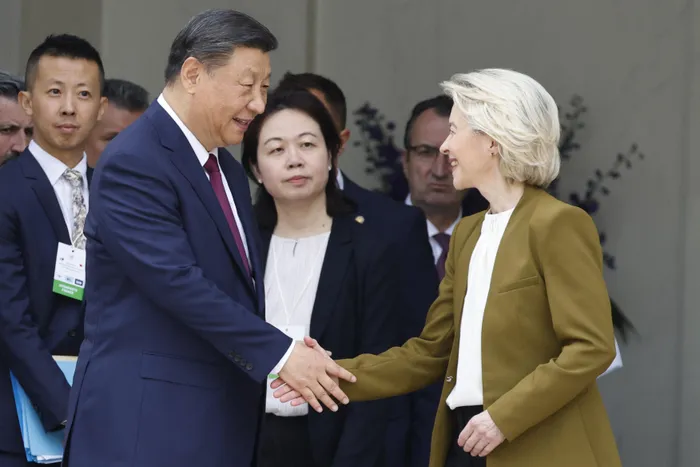
Chinese President Xi Jinping shakes hands with European Commission President Ursula von der Leyen as they leave after holding a trilateral meeting, which included the French President, as part of the Chinese president's two-day state visit, at the Elysee Palace in Paris, on May 6, 2024.
Image: AFP
The idea of the world changing has become a habit, year-on-year, that statement provides no new information. Nonetheless, this opinion points out that what is happening [with strong support] is that global relationships are changing–old friends have become foes and new friends have been foes. This particular change rings true for the US and elsewhere. It also provides hope for ongoing disagreements, conflicts and war.
Looking at tariffs, China has seen some of the highest rates against it by any country, in the form of Trump’s Liberation day tariffs. Since 14 May, both the United States and China have agreed to suspend 90% of their Liberation Day tariffs for a period of 90 days and have withdrawn several other retaliatory duties. As a result, tariffs imposed by the US on Chinese goods dropped to 30%, while China will reduce its tariffs on American products to 10%. Although this does not signify a friendship, it does signal a willingness to reconvene on measures through communication. It indicates that the relationship between China and the US were at its worst when the US announced the Liberation Day tariffs (145%) against China.
China and the European Union (EU) have traditionally maintained stable relations, with minimal conflict over core interests and strong economic and cultural ties. By 2022, China had become the EU’s top import source and third-largest export destination, with bilateral trade surpassing €856 billion. European firms like Siemens, Airbus, and BMW are heavily invested in the Chinese market, fostering collaboration in technology and industry. However, mounting political pressure from the United States has disrupted this trajectory, prompting the EU to impose curbs on Chinese tech companies, scrutinise investments, and restrict academic exchanges—moves driven more by external influence than inherent discord. Amid Donald Trump’s renewed political presence and his assertive “America First” stance, the EU is increasingly recognising the value of strategic autonomy, pushing for a more balanced foreign policy and a reimagined, independent engagement with China.
BRICS has played a fundamental role in relationship-building, particularly amongst those members of the global south. In fact, the beginning of this year saw Indonesia join as an official member of BRICS and official partners: Belarus, Bolivia, Cuba, Kazakhstan, Malaysia, Nigeria, Thailand, Uganda, Uzbekistan. These relationships entail economic, social, political, and environmental engagement fostering a commitment to shared development. The grouping is instrumental regarding the strong relationships between–China-Russia, China-South Africa, South Africa-Brazil. The grouping reinforces the autonomy of its members and partners often creating a revived awareness of previous or current relations that are or were exploitative and infringes national autonomy.
On the point of relations there exists wars and conflicts that seem very permanent with no resolution in sight. The Russia-Ukraine conflict has seen devastations that killed many. Many countries are attempting to find a solution to the situation, for example, China, the EU, and South Africa. Putin and Trump’s relationship appears strained by recent reports, as Trump attempts to have Ukraine & Russia come to a consensus, his efforts have seemingly rendered itself meaningless.
The Israel-Palestine conflict is one that has perpetuated for many years since 1948 when Israel became a sovereign state. This conflict puts to task the notion that there are no permanent enemies. It has no real time when it will stop, even with external efforts to alleviate the issues. The US has positioned itself as an ardent supporter of Israel and other nations, like South Africa, are bastions for the cause of the Palestinian people. It is thus unsurprising that the US, under Trump, has accused South Africa of a fictitious “white genocide” as South Africa has taken Israel to the International Court of Justice (ICJ) for the genocide of the Palestinian people. There are, in fact, very real genocides (at cumulative recorded deaths) in Sudan and the Democratic Republic of Congo (DRC) as examples.
The principle that there are no permanent friends or foes in global politics is more visible in today’s rapidly shifting geopolitical climate. Relationships once thought stable—like those between the US and the EU—are evolving under pressure, revealing both fragility and potential. While tariff wars and political tensions mark deep rifts, temporary pauses in hostility and renewed dialogue suggest that cooperation remains possible, even after periods of hostility. However, perpetual conflicts such as those in Ukraine and Palestine challenge this notion, raising critical questions about whether some enmities can truly end. Amid this complexity, BRICS and its expanding network offer hope for a more balanced, multipolar world—where nations from the Global South engage on more equal terms, are weary of external pressures, and reaffirm their sovereignty through strategic partnerships. In a world of fickle loyalties and enduring struggles, BRICS stands as a testament to the possibility of resilient and principled international cooperation.
Written By:
*Cole Jackson
Lead Associate at BRICS+ Consulting Group Chinese & South American Specialist
**The Views expressed do not necessarily reflect the views of Independent Media or IOL.
** MORE ARTICLES ON OUR WEBSITE https://bricscg.com/
** Follow @brics_daily on X/Twitter & @brics_daily on Instagram for daily BRICS+ updates
